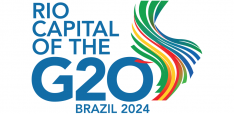Brazil's insurgency should serve as warning to the Global South: The West will not protect us

At least 39 people have been charged following the riots in Brazil’s capital earlier in January. Not only is it the latest mockery to strike the world’s democracies, it is a warning to all of us in the Global South of what’s to come.
The recent violence in Brazil cannot be divorced from another conflict – the war on Mother Nature.
Some Brazilian indigenous activists have even claimed the violence – which included the destruction of centuries-old artefacts - is akin to annihilation the Amazon rainforest experienced for years under former President Jair Bolsonaro.
It is not a coincidence the turbulence occurred one week after President Lula resuscitated a 1 billion Amazon fund - which included several executive orders to prevent deforestation and protect indigenous rights - creating the first-ever position of Minister for Indigenous Peoples.
Lula’s opponent Bolsonaro – a climate change denier now conveniently holed up in Florida a couple hours from his ally, former US President Donald Trump - notoriously operated off a laissez-faire attitude to the Amazon rainforest. He was responsible for laws which encouraged illegal extraction activities, side-lined minority communities, and saw deforestation levels reach 14-year highs. Moreover, only this week, President Lula accused Bolsonaro of committing genocide against the Amazon’s indigenous Yanomami community, which have been desecrated by malnutrition and disease linked to illegal mining and deforestation activities. While who is behind the Brazil insurgency remains unclear, reports indicate that interest groups from the Amazon (farmers, truckers etc) used crowdsourcing platforms like Pix to fund the rioters.
The behind-the-scenes players who funded Bolsonaro’s campaign were the big business elite, including the powerful Brazilian agribusiness lobby, as well as European and American-led corporations/business owners, who profit from the destruction of the Amazon – and its indigenous peoples. But instead of talking about the roles that American investment group BlackRock, or British agricultural firm, Cargill, play in funding the deforestation of the Amazon, Western pundits have been quick to use the riots to further their own agenda. Liberal media compared the events to the storming of the US Capitol on January 6th, while commentators like Tucker Carlson used the riots as proof of a ‘rigged election.’
But is anyone talking about the West’s role in all this? Because this reality isn’t only confined to Brazil.
Across Africa, and the entire Global South, major corporate interests from the Global North override the needs of local indigenous communities. The same trend exists in my home of Gambia, as well as many other African nations, where political instability and environmental devastation go hand in hand. For example, although various countries from the Global North, including the US, UK and the European Union, pledged billions to protect the Congo rainforest in 2021, the DRC still experiences some of the highest rates of illegal deforestation in the world. The very same countries who pledged to protect it demand raw virgin wood, rubber, and other commodities which are then sourced through illegal means.
This pattern contributes to resource strains, and land wars, which spill into geopolitical and national security issues. Environmental concerns are even fuelling an increase in extremism; Boko Haram and ISIS are both organizations that use climate-related societal unrest to recruit new members.
Indeed, the West’s insatiable consumption patterns are evidence of a larger legacy of green colonialism – one which is proliferating today in conflict zones across the Global South. And if we cannot trust our own politicians, or the West, to do what needs to be done to protect the climate and secure supply chains, then who can we trust?
To answer this question, I took part in Duke University’s ‘Youth Interfaith Leaders Fellowship on Climate Change,’ a first-of-its-kind program in partnership with Faith For Our Planet (FFOP).
I was one of thirty Fellows, who all originated from twenty countries, invited to participate in the week-long fellowship which saw industry-leading experts, academics, and scientists gather to discuss how young people of faith can use religious networks to pursue tangible climate action.
FFOP, which was founded by the Secretary-General of the Muslim World League, Dr. Mohammed bin Abdulkarim Al-Issa, is a global interfaith climate NGO. It has held events from The Gambia to London with the goal of targeting problem areas in the Global South (and Global North) with solutions-oriented, grassroots approaches.
Indeed, across the Global South we have come to rely on a vast network of moral and faith leaders. These networks are invaluable resources when it comes to climate change activism. Religious institutions are often the most trusted authority in the Global South and they are invaluable for galvanizing the on-the-ground changes which are crucial to long-term environmental sustainability.
As the world collectively pursues more climate action, initiatives like FFOP’s will become all the more important.
Ultimately, Brazil’s problems are all of our problems. Until the West sits up and takes notice, what we witnessed in Brazil could very well become the norm for countries across the Global South.
Abdoulie Ceesay is the Deputy Majority Leader of the National Assembly of The Gambia. As a Member of Parliament, he serves on Committees for education, trade, youth, human rights, and constitutional matters. Ceesay is also a member of The Gambia’s delegation to the African, Caribbean and Pacific (ACP) states – for the EU Parliamentary Assembly. He is also the founder of the Help Foundation Gambia, a charitable organization. Ceesay also serves as Secretary for The Gambia Parliamentary Youth Caucus.
During his first term in office, he was involved in successful efforts to pass a new anti-corruption law, an access to information law, as well as a bill encouraging women enterprise. Ceesay was notably profiled in international media in 2018 as one of the young Gambians entering politics following the long-time dictator Yahya Jammeh. His political career has been reported on in publications from the United States to China.
Photo by Rifqi Ramadhan

